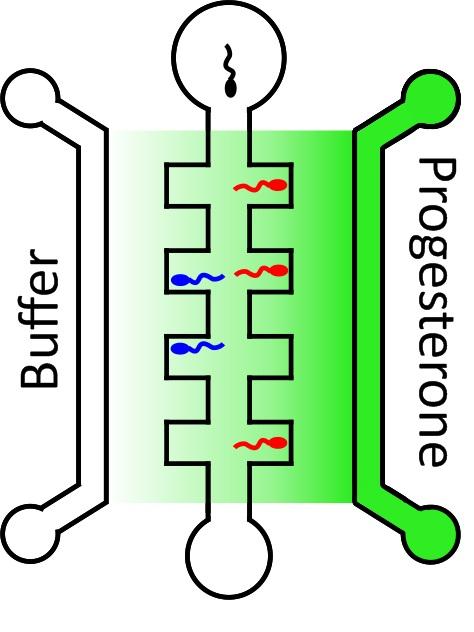
Credit: Adapted from Analytical Chemistry 2019, DOI: 10.1021/acs.analchem.9b05183
Current tests for male fertility include measuring the concentration and motility of spermatozoa. However, other characteristics of sperm, such as their ability to follow a chemical trail to the egg, can influence the likelihood of fertilization. Now, researchers reporting in Analytical Chemistry have devised a quick and convenient microfluidic chip to assess this chemotactic response of spermatozoa, which could help provide a more complete picture of a man’s fertility.
Sperm use chemotaxis, or movement toward increasing or decreasing concentrations of a substance, to guide their journey through the fallopian tube to the egg. Progesterone is present at high concentrations in the fluid that surrounds the egg, and previous studies have indicated that the hormone can attract and activate spermatozoa of some mammalian species. Scientists have used microfluidic devices — plastic or hydrogel chips with tiny channels through which liquids flow in a highly controlled manner –to study sperm chemotaxis. But the devices have had various limitations, such as the need for pumps to drive the flow of fluid, which could affect sperm motility. Loes Segerink, Johanna Berendsen and colleagues wanted to develop an improved, pump-free microfluidic device that could quickly identify small differences in the chemotactic behavior of sperm.
The researchers designed a microfluidic chip about the size of a postage stamp. The chip, which they made with an agarose/gelatin material, contained various channels and side chambers. The researchers created a concentration gradient of progesterone in the device from left to right, and saw that more boar spermatozoa added to the device swam to the right side chambers (high progesterone) than the left (low progesterone), which shows chemotactic movement. In addition to fertility testing, the device could be used to investigate other substances that could also contribute to sperm’s guidance mechanism, the researchers say.
###
The authors acknowledge funding from the University of Twente and the Dutch Technology Foundation STW.
The study is freely available as an ACS AuthorChoice article here.
For more research news, journalists and public information officers are encouraged to apply for complimentary press registration for the ACS Spring 2020 National Meeting & Exposition in Philadelphia.
The American Chemical Society (ACS) is a nonprofit organization chartered by the U.S. Congress. ACS’ mission is to advance the broader chemistry enterprise and its practitioners for the benefit of Earth and its people. The Society is a global leader in providing access to chemistry-related information and research through its multiple research solutions, peer-reviewed journals, scientific conferences, eBooks and weekly news periodical Chemical & Engineering News. ACS journals are among the most cited, most trusted and most read within the scientific literature; however, ACS itself does not conduct chemical research. As a specialist in scientific information solutions (including SciFinder® and STN®), its CAS division powers global research, discovery and innovation. ACS’ main offices are in Washington, D.C., and Columbus, Ohio.
To automatically receive news releases from the American Chemical Society, contact [email protected].
Follow us on Twitter | Facebook
Media Contact
Katie Cottingham
[email protected]
301-775-8455




